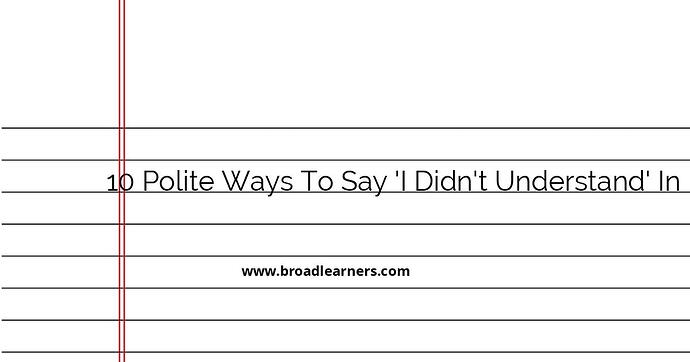When you don't understand something in a conversation, it's important to politely communicate your confusion. Saying 'I didn't understand' straightforwardly may come off as rude or dismissive. Here are 10 polite ways to say 'I didn't understand' in English:
- I'm afraid I don't follow
- I'm sorry, but I didn't catch that
- Could you please repeat that?
- I'm a bit confused, could you clarify?
- Could you elaborate on that point?
- I'm having trouble grasping what you mean
- I'm not sure I quite understand
- Would you mind explaining that again?
- Could you break that down for me?
- I'm finding it hard to follow, can you simplify it?
These alternatives to 'I didn't understand' can help you maintain a respectful and open communication while seeking clarification. Choose the phrase that best aligns with the tone of the conversation and your relationship with the speaker.
1. I'm Afraid I Don't Follow
Using this phrase conveys your lack of understanding in a polite and respectful way. It shows that you are actively trying to comprehend the information but are facing difficulty.
For example:
Speaker: The report highlights our key objectives. Are there any questions so far?
You: I'm afraid I don't follow. Could you explain the objectives in more detail?
2. I'm Sorry, but I Didn't Catch That
This phrase indicates that you may have missed a crucial piece of information and need the speaker to repeat or clarify it.
For instance:
Speaker: The deadline for submission is next Friday.
You: I'm sorry, but I didn't catch that. Could you confirm the deadline again?
3. Could You Please Repeat That?
This direct and polite request asks the speaker to say the information again for better understanding.
Example:
Speaker: Let's meet at 9 a.m. tomorrow.
You: Could you please repeat that? I didn't quite catch the time.
4. I'm a Bit Confused, Could You Clarify?
Indicating confusion and seeking clarification is essential in maintaining effective communication.
Example:
Speaker: The financial projections indicate a growth of 15%.
You: I'm a bit confused, could you clarify how the growth percentage was calculated?
5. Could You Elaborate on That Point?
This phrase requests more detailed information to enhance your comprehension of the topic being discussed.
For example:
Speaker: Our marketing strategy focuses on digital campaigns.
You: Could you elaborate on that point? How do the digital campaigns align with our goals?
6. I'm Having Trouble Grasping What You Mean
Expressing difficulty in understanding shows that you are engaged in the conversation but require further explanation to grasp the concept.
For instance:
Speaker: The new software integrates seamlessly with our existing tools.
You: I'm having trouble grasping what you mean. Could you demonstrate how the integration works?
7. I'm Not Sure I Quite Understand
This phrase indicates uncertainty in your comprehension and prompts the speaker to provide additional clarification.
Example:
Speaker: The project timeline has been revised due to unforeseen circumstances.
You: I'm not sure I quite understand. Can you explain the changes in more detail?
8. Would You Mind Explaining That Again?
A polite request like this conveys your willingness to learn and your respect for the speaker's knowledge.
Example:
Speaker: The new policy will be effective from next month.
You: Would you mind explaining that again? I want to ensure I have all the details correct.
9. Could You Break That Down for Me?
This request asks the speaker to simplify complex information into smaller, more manageable parts for better understanding.
For instance:
Speaker: The proposal outlines three key phases of implementation.
You: Could you break that down for me? What are the main objectives of each phase?
10. I'm Finding It Hard to Follow, Can You Simplify It?
Expressing difficulty in following the discussion and requesting simplification shows your dedication to understanding the topic.
For example:
Speaker: The algorithm optimization process involves several stages.
You: I'm finding it hard to follow. Can you simplify the stages for me to understand better?
Did I miss anything? Respond below
